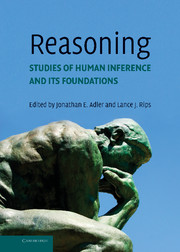36 - Presupposition, Attention, and Why-Questions
Published online by Cambridge University Press: 05 June 2012
Summary
Philosophers and psychologists share an interest in understanding the everyday activity of explaining, which I take up as it intersects pragmatics and reasoning. How does the distinction between the focus and the presuppositions of why-questions orient or bias answers to those questions and what are the implications for conclusions drawn of systematic errors and fallacies, particularly in how subjects respond to why-questions about chance phenomena?
The pragmatics perspective is usually construed as an attempt to show that the experimenter's presentation misleads subjects with the implication that the experimenter's ascription of errors and fallacies is not warranted. Schwarz (1996), in a book extending research on pragmatic influences on experimental judgments, writes in an introductory chapter:
Research participants …have no reason to suspect that the researcher is not a cooperative communicator and are hence likely to find meaning in the researcher's contributions.
The findings reviewed in the following chapters suggest that this basic misunderstanding about the cooperative nature of the communication in research settings has contributed to some of the more puzzling findings in social and psychological research and is, in part, responsible for the less than flattering picture of human judgmental abilities that has emerged from psychological research.
(1996: 5)The role of pragmatics that I explore is related, but it leads to a different, although strictly compatible, conclusion. Pragmatics contributes to explaining subjects' responses. But the contribution I follow out supports ascriptions of erroneous reasoning. I take for granted that explaining is not justifying.
Information
- Type
- Chapter
- Information
- ReasoningStudies of Human Inference and its Foundations, pp. 748 - 764Publisher: Cambridge University PressPrint publication year: 2008
